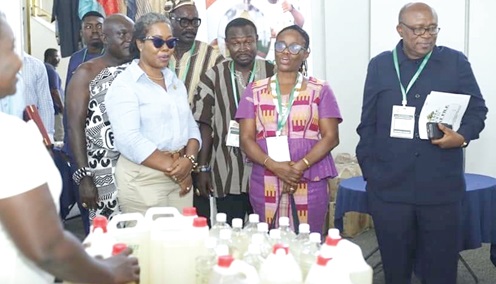The government has created more than 350,000 jobs through the coconut value chain in the last seven and half years.
The employment was generated through significant investment in the coconut sub-sector since 2017 by procuring and distributing disease-tolerant coconut seedlings to coconut farmers across the major coconut growing regions including Volta, Eastern, Western, Central and Ashanti.
The Chief Executive Officer (CEO) of the Ghana Exports Promotion Authority (GEPA), Dr Afua Asabea Asare, said so far, the government, through the GEPA, had distributed over one million seedlings covering 15,625 acres to farmers, generating about 350,000 employments within the value chain.
She explained that it was under the coconut revitalisation intervention aimed at reviving the ailing coconut industry to improve the supply capacity of the value chain, having realised the growing demand trend for coconut globally.
Speaking at the opening of the International Coconut Festival Ghana in Accra last Monday, Dr Asare stated that the coconut industry had grown into one of the most dynamic sectors, not only contributing significantly to the country’s export base but also touching the lives of many families and communities in positive ways.
The festival
The yearly festival brings together players in the coconut value chain, including growers, exporters and researchers, mainly from academia to discuss issues that can support the development of the industry.
The fourth edition, which was held between October 21 and 23, 2024, was on the theme, “Empowering lives through coconut: Innovation, employment and sustainable livelihoods.
Speakers and panellists included the Country Director, Solidaridad, Eric Agyare; CEO, the Tree Crop Development Authority (TCDA), William A. Quaittoo; President, the Ghana Union of Traders Association (GUTA), Dr Joseph Obeng and the Chief Director, the Ministry of Food and Agriculture (MoFA), Paul Siameh.
The opening was chaired by the CEO of JIREH Micro-Finance, Dr Akorfa Ahiafor.
It was organised by the African Coconut Group (ACG) with support from the GEPA, the Western Regional Coordinating Council (WRCC) and other corporate entities.
Capacity building
The CEO said the GEPA was committed to supporting this innovative spirit by providing platforms for capacity building, research and technological advancement to ensure that Ghanaian coconut products remained competitive and sustainable.
He said the coconut industry had already proven its potential to create thousands of jobs, particularly for women and the youth.
“By supporting initiatives that expand processing facilities, improve access to finance and encourage entrepreneurship, we can significantly boost employment opportunities in this sector.
“The smallholder farmers, who cultivate the crop to the processors and exporters, the industry supports thousands of direct and indirect jobs. What is even more promising is the potential for more job creation as the sector continues to expand,” he said.
Credit facility
For his part, Mr Siameh who represented his minister, stated that the government had secured a $200-million credit facility from the World Bank to further develop four key crops, including coconut, cashew, rubber and cocoa.
He said the facility, which was made possible through the Tree Crop Development Authority, would be used for institutional strengthening and value chain governance to ensure efficient and effective oversight of the sub-sectors of improved crop productivity.
He said it was expected to support climate resilience to safeguard long-term agriculture sustainability, back post-harvest management value addition and market access to maximise economic benefits of the coconut industry.
Beacon of hope
The Western Regional Minister, Kwabena Okyere-Darko, said the coconut industry emerged as a beacon of hope that promised a transformative impact.
“There is, therefore, the need to showcase the versatility and potential of coconut-based products and the contribution it has made to the local economies of many countries across the globe, especially the Asian countries,” in a speech read on his behalf by a representative, Fredrick Agyemang.


